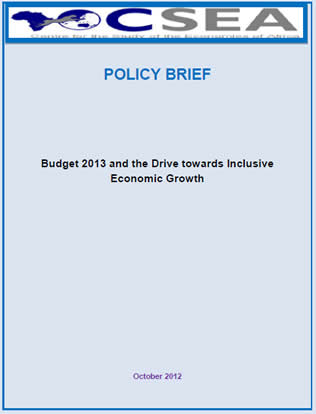Publication Date:October, 2012
Document Size: 5pages
The budget proposal for fiscal year 2013 was presented to the joint session of the national assemblyby President Goodluck Jonathan on October 10, 2012. Titled Budget of Fiscal Consolidation withInclusive Growth, the budget proposal is tied to the 2013-2015 Medium Term ExpenditureFramework (MTEF) which provides the fiscal path for the next three years. Table 1 shows that thetotal expenditure of N4.92trn is 4.8% higher than the approved expenditure for 2012 while the totalrevenue accruable to the federal government is projected at N3.89trn, 9.2% higher than the budgetedN3.56trn in 2012. Juxtaposing the planned expenditure and projected revenue for 2013, thegovernment hopes to reduce the fiscal deficit to 2.17% of GDP as against 2.85% of GDP in 2012.However, the amount set aside for debt servicing increased by 5.7% to N591bn. A break-down of theexpenditure shows that a total of N1.54trn is projected to be spent on capital projects compared toN1.34trn in 2012 while recurrent expenditure is down marginally by 0.6% to N2.41trn. Statutorytransfers are down by 4.5% to N380bn from N398bn in 2012.

